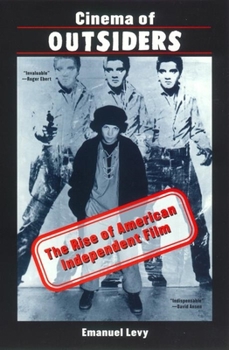Cinema of Outsiders: The Rise of American Independent Film
Select Format
Select Condition 
Book Overview
A deep dive into the emergence and success of independent filmmaking in America
Format:Paperback
Language:English
ISBN:0814751245
ISBN13:9780814751244
Release Date:March 2001
Publisher:New York University Press
Length:601 Pages
Weight:2.00 lbs.
Dimensions:1.6" x 6.0" x 9.0"
Related Subjects
Arts, Music & Photography Communication & Journalism Communication & Media Studies Direction & Production Film & Television Humor & Entertainment Industries & Professions Media Studies Movies Performing Arts Politics & Social Sciences Social Science Social Sciences Sports & Entertainment TextbooksCustomer Reviews
2 ratings
Very comprehensive, maybe too much?
Published by Thriftbooks.com User , 17 years ago
This book is quite comprehensive, and appears to be one of the better ones in its genre. It covers a lot of directors and explains the contexts in which they worked quite adequately. The index/timeline features in the back are a nice touch for people doing research. The only thing I really disliked about this book was the author's tendency to go on and on about a director's particular film--just when you think he's said enough about the movie, a few more paragraphs follow, which after a while one ends up wanting to skip over. I can see where this might be a useful feature, but for me it tended to break up the continuity of the text.
Cinema of Outsiders
Published by Thriftbooks.com User , 24 years ago
"CINEMA OF OUTSIDERS: The Rise of American Independent Film"A BOOK REVIEW by Harvey Karten, film_critic@compuserve.comEmanuel Levy, "Cinema of Outsiders: The Rise of American Independent Film," New York: New York University Press, cl999, 601pp. Emanuel Levy among those who prefer the challenging, edgy, sometimes outrageous movies that are released outside of the Hollywood studios' network. The author of six books with yet another, a biography of critic Andrew Sarris, in the works, Levy is a senior editor with "Variety" magazine. He does not at any time come right out and declare his partiality to the indies, but his passion for the concept of non-mainstream cinema (or at least for the good ones) surfaces on every page. Ironically, "Variety," the slick trade publication for the entertainment industry which regularly promotes and writes about the biggies, should be the last place Levy wouldembrace as a home. Yet the critic--whohabitually knocks out prescient reviews of the latest pictures using that publication's popular jargon such as "pix," "thesps," and "helmers"--has an overall contempt for the safe, for the movies made strictly to appeal to the lowest common denominator and therefore bring in the big bucks for the studios. This is not to say that he glorifies the entire independent ouevre. Discussing three hundred films albeit not in great depth, Levy gradually unfolds to the reader what he likes and what he does not among indies released from 1977 to the present and has the same disdain for poor quality individualistic films as he has for the blockbusters. He derides the studied, the predictable, the simplistic, the not credible, the subjects which are inadequate for full-length treatment, the charmless, the absent-of-wit--all the deadly sins for which blockbusters are often culpable. The bulk of the 601-page text is taken up with an encyclopedic survey of indie films released during the past thirty-two years, the sort of scan you can find in most of the popular annuals which capsule-review cinematic output in alphabetical order. Neither alphabetical nor chronological, Levy's book treats the films thematically. Chapters have such titles as "Fathers and Sons," "The New York School of Indies," "The Resurrection of Noir," "Challenging Stereotypes," "The New Gay and Lesbian Cinema," "Female/Feminist Sensibility," and "The New African American Cinema." This body of commentary makes the book a must for public libraries and for the home bookshelves of all who have a passion for thoughtful, cutting-edge movies. While much of what Levy says is duplicated by Leonard Maltin, Roger Ebert, and David Thomson in annuals and studies that review and comment upon the pictures and their makers, Levy's commentary provides a distinctive voice, one which extols the independent movies to a greater degree thando the other popular critics. I would have preferred that he downplay the laundry list of films in favo





